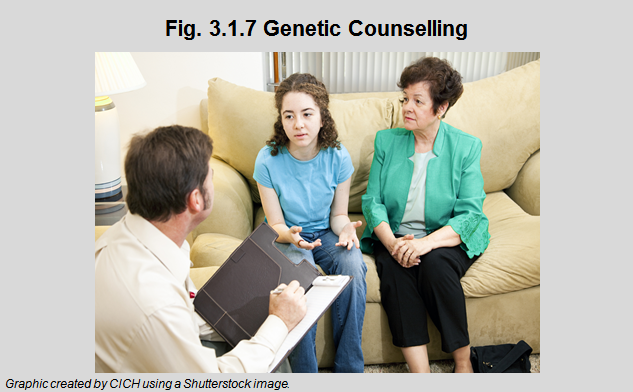Genetic Counselling

…continued
• Understand the latest research or treatment information.
• Decide on the best course of action for the family in view of their risk, family goals, and ethical and religious standards.
• Discuss the best possible treatment options for the condition that also considers the risk of recurrence for the disorder.
• Obtain referrals to medical specialists, advocacy and support networks, and other resources and support groups.1,2,3
1 Canadian Association of Genetic Counsellors. What is a Genetic Counsellor? Oakville, Canada: Canadian Association of Genetic Counsellors.
http://www.cagc-accg.ca/doc/what%20is%20a%20genetic%20counsellor%20-%20english.pdf
2 Fraser FC. Genetic Counseling. American Journal of Human Genetics. 1974;26:636–61; cited in Leeming W. Looking Back on the Future of Genetic Counselling in Canada. CBMH/BCHM. 2013;30:1.
3 Johns Hopkins National Human Genome Research Institute. Making Sense of your Genes: A Guide to Genetic Counseling. Chicago: National Society of Genetic Counselors, Inc. and Washington, DC: Genetic Alliance; 2008. http://www.kumc.edu/gec/prof/guidetogc.pdf
Genetic counselling involves communicating with patients and families about the issues that arise when someone has a genetic condition, or if there is risk of a genetic condition in a family. Genetic counsellors help an individual or family to:
• Understand the medical facts, including a child’s diagnosis, how the condition will affect his/her health and wellbeing, and what treatment and support are available.
• Review their family and medical histories.
• Understand how genetic conditions are passed down through families.
• Determine if genetic testing is available for a genetic condition.
• Understand the risks associated with the condition.
• Understand the options for dealing with a genetic condition so they can make informed decisions regarding genetic testing. continued…
